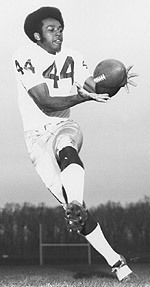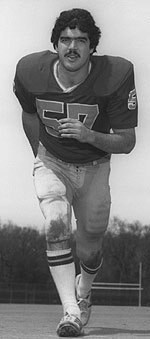Oct. 8, 2004
CATCHING UP WITH ….. Mike Townsend
By Craig Chval
It only seems appropriate that Notre Dame had to come up with an “interception” of its own in order to land the player who still holds the Irish record for interceptions in a single season.
Unlike his older brother Willie, Mike Townsend did not grow up dreaming of playing football at Notre Dame. So while Willie was learning his way as a freshman on the Irish squad in 1968-69, Mike was a high school senior entertaining offers from dozens of colleges.
After deciding to attend Purdue, Mike returned home from school to find Irish assistant coach Brian Boulac, much to his surprise. Somehow, Boulac had learned of Mike’s decision and had decided to pay a visit – completely legitimate under NCAA rules at the time. Boulac spent a couple of hours “recruiting” Mrs. Townsend while awaiting Mike’s arrival.
Mike’s mom was convinced that Notre Dame was the place for him, but remained true to the promise she had made along with Mike’s father to leave the decision to Mike. A little while later, Mike’s girlfriend arrived – presumably not orchestrated by Boulac – and told Mike that he should go to Notre Dame.
Mike hadn’t previously involved his girlfriend in the decision-making process, but once he did, she decided that an all-male school was definitely the place for Mike. (No, Mike didn’t tell her about the proximity of St. Mary’s College to Notre Dame; and no, Mike did not eventually marry the young woman.)
The rest, as they say, is history – literally. As a junior, Townsend led the nation with his 10 interceptions. Townsend’s 13 career interceptions rank third on the all-time Notre Dame list. In 1973, he earned consensus All-America honors to help lead Notre Dame to a national championship. Not only was Mike reunited with big brother Willie on the football field, but the pair also played varsity basketball.
After retiring from professional football, Townsend returned to Ohio, where for the past 22 years, he has worked for the U.S. Department of Energy. Townsend has five children, including a son who played varsity basketball at Tennessee-Chattanooga, and another studying engineering at Duke. Townsend lives with his wife and three high school-age children in his hometown of Hamilton, Ohio.
CATCHING UP WITH …..TOM GATEWOOD
Amid the 464-page Notre Dame media guide, even an All-American can become a footnote to history. A two-time All-American and the holder of Notre Dame’s single-season record for receptions (77 in 1970), Tom Gatewood is determined to prevent that from happening to him.
Realizing that he has more to offer than faded newspaper clippings, Gatewood jumped at the opportunity to become involved with a committee charged with trying to find NCAA-approved ways for former Irish football players to become involved in the current program.
One way Gatewood does that is with visits to Notre Dame practices.
“Being on the practice field and demonstrating tips for the players was almost as if I had come out of a cartoon or as if I had come off of the pages of a book,” relates Gatewood.
Sometimes, Gatewood provides his own resume.
“I like to show footage – no more than 2-3 minutes,” he says. “Then the players can see that even though I’m gray and wrinkled, in my day, I could do what they do.”
Gatewood’s list of accomplishments didn’t end when he graduated from Notre Dame. Blue Atlas Productions, an ad specialty company owned by Gatewood, numbers American Express, Merrill Lynch and NBC among its clients. Gatewood’s video/television production company, Larkspur Lane Ltd., has an Emmy to its credit.
“It’s good for players to see those things,” Gatewood says. “But they also need to hear that before you get to this point, you’ve got to do what you’re doing right now and you’ve got to do it well.”
Notre Dame surely would be well served were Gatewood to become a role model for current players.
Gatewood attributes much of his success at Notre Dame to Irish coach Ara Parseghian and quarterback Joe Theismann. Rather than national awards, Gatewood speaks with pride of being elected by his Irish teammates captain both of the freshman team and later the varsity squad.
To Gatewood, a three-touchdown performance against Army in Yankee Stadium is noteworthy because of how much his parents – who had never seen him play football before – enjoyed the experience.
Having already made his own history, Gatewood is trying to help Tyrone Willingham and his players make their own history – on and off the field.
CATCHING UP WITH …..JOHN SCULLY
John Scully hates to be labeled – and he lives like it. Scully became an All-American center for Notre Dame in 1980 after switching from offensive tackle. In the NFL, Scully moved to guard, where he was a perennial starter for the Atlanta Falcons.
Since retiring from football, Scully has continued to defy labeling. A lifelong musician who almost chose to play football at Penn State, motivated largely by that university’s school of music, Scully embarked on a career writing and producing commercial music – from CDs to television and radio commercials. He gained perhaps his greatest notoriety for writing and recording “Here Come the Irish,” a song about the University of Notre Dame that – wouldn’t you know it – doesn’t contain a single explicit reference to football.

The combination of Joe Theismann to Tom Gatewood still ranks as one of the most prolific scoring duos in Notre Dame history. Gatewood’s 157 receptions for 2,283 yards still rank as the best in the Irish record books.
|
|

John Scully is one of 78 Notre Dame players who has garnered consensus All-America honors. The Huntington, N.Y. native earned the accolade following his senior season in 1980.
|
The song illustrates Scully’s willingness to take on a daunting challenge. It wasn’t as if Scully and co-producer Jim Tullio had never heard “The Notre Dame Victory March.”
“We wanted a distinctive effort,” Scully says. “But we wanted something perpendicular, not opposite.”
The universal acclaim which greeted the release of “Here Come the Irish” left no doubt that Scully and Tullio had hit their target.
“The lyrics are from an observer’s point of view,” Scully explains.
“It doesn’t matter if you’re an All-American, the president of the University or a freshman in his first semester, everyone ends up being a brick in the wall.”
Scully is proud of what he and his teammates accomplished at Notre Dame. The 1980 team he captained as a senior surprised nearly everybody by climbing to the top of the polls by November. But Scully doesn’t spend much time reliving those days.
“We get to go out every day and write our own biographies,” he says. “What I did at Notre Dame is ancient history.”
Two labels which Scully does gladly embrace are that of husband and father. Living in Joliet, Ill., with his wife and two teenage daughters, Scully has changed labels once again, entering the commercial insurance field.
The early indications are that Scully will be labeled a success once again.







